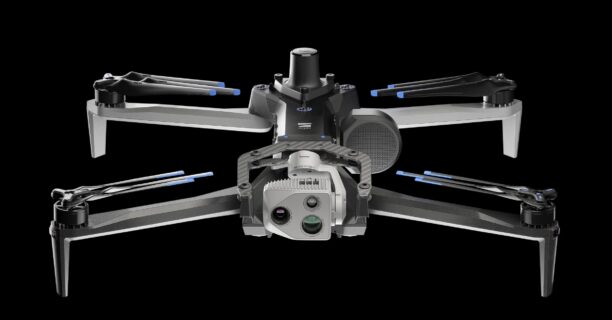Industry Faces Regulatory and Security Hurdles, but FAA Collaboration Sparks Hope


The AUVSI New England UAS and AAM Summit kicked off with a powerful morning keynote from AUVSI President and CEO Michael Robbins. Against the backdrop of the conference theme, “If We Build It, Will They Come?” Robbins addressed the state of the drone industry, focusing on two pivotal issues: the critical need for a rule on beyond visual line of sight (BVLOS) operations to scale complex missions, and the urgency of limiting Chinese-manufactured drones in the U.S. to support fair competition and national security. Robbins highlighted both challenges and progress in these areas, providing an honest but hopeful view of the drone sector’s trajectory.
Pushing for a BVLOS Rule to Scale Operations
BVLOS capabilities are essential to growing the drone industry, Robbins stressed, but the lack of a clear regulatory framework is holding things back. Without a BVLOS rule, complex drone operations remain limited, restricting the potential for scalability and profitability. While waivers and exemptions allow some companies to perform advanced missions, they’re still outliers. “Waivers and exemptions are a great step,” Robbins stated, “and allow companies to do more than they’ve ever done before – and do more good. But it’s not enough. Those are still exceptions.”
Robbins emphasized that a formal BVLOS rule would bring the reliability that investors and operators need to make substantial commitments. Although the FAA has worked closely with the industry, evident in the progress made at the key site in Dallas Fort Worth enabling commercial drone delivery and other complex operations, the timeline for BVLOS rulemaking has been frustrating.
“The ARC delivered its report in March of 2022,” Robbins said, “and we’re now in November of 2024 and don’t even have a draft rule. That’s a timeline that’s untenable.” The FAA passed the draft BVLOS rule to the Department of Transportation (DOT) in July, but it has yet to be released. “We’re angry about it,” said Robbins. “Quite honestly, we’re frustrated. There’s no reason to delay a draft rule – it’s a draft. It’s spooking investors, and it’s spooking the industry.” Robbins reaffirmed that AUVSI is pressing for a resolution, as the delay causes mounting concern.
In Robbins’s view, the FAA’s commitment is clear and efforts to collaborate have ramped up in recent years: but the industry’s future growth still hinges on regulatory certainty. “This is a new day at the FAA…They are committed to making sure that the U.S. maintains its position as a leader,” Robbins said, underscoring that without BVLOS rulemaking, domestic drone companies will continue to struggle to grow and keep up with international competition.
Addressing the Chinese Drone Challenge and National Security Concerns
Robbins also called attention to the need to limit Chinese-manufactured drones in the U.S. market, both for fair competition and to address significant national security concerns. Robbins said that Chinese drones, often backed by state subsidies, have flooded the market at low prices, making it difficult for U.S. companies to compete on a level playing field. This competitive imbalance comes alongside substantial security concerns.
FBI Director Christopher Wray has been particularly vocal about the risks, repeatedly highlighting Chinese-manufactured drones as a significant threat to U.S. security. Robbins echoed this: “There are very real security concerns. For those that are in the know on this and have seen some of the documents that are still classified, that threat is clear.” Robbins emphasized that the evidence behind these concerns is strong and has prompted AUVSI to confront the issue, even as some industry players push back. “We decided about a year ago that we were going to take this issue head-on. We’ve taken some flak about this from the industry – but it was the right thing to do, and we’re not backing down.”
In partnership with the Defense Innovation Unit, AUVSI launched the Green UAS cybersecurity program to ensure a secure supply chain, emphasizing that drones in the U.S. market must be free of components from the People’s Republic of China (PRC) and that manufacturers must meet stringent cybersecurity standards. “We’re moving the industry in the right direction on that,” Robbins stated, noting that the program aims to raise security standards across the board.
Robbins also hinted at potential legislation to limit the influx of Chinese-manufactured drones. “Regardless of who wins in November, I think we’re going to see action from the current administration about this,” he noted. While acknowledging that U.S.-made drones may never be as inexpensive as Chinese counterparts, Robbins stressed that as U.S. companies scale production, costs should come down. “That’s economics 101,” he stated. “We’re never going to be as cheap as China. We need to accept that and build it into the plan.”
Charting a Course for a Secure, Scalable U.S. Drone Industry
Robbins closed his keynote by emphasizing that while the U.S. drone industry faces regulatory and security challenges, there is also reason for optimism. Progress with the FAA and the commitment of the industry signal a positive shift. A formal BVLOS rule, alongside measures to limit Chinese-manufactured drones, could set the stage for a competitive, scalable, and secure U.S. drone sector. As Robbins pointed out, “We can now compete on capability. That wasn’t always true, but US drones are now as capable, or sometimes more capable, than their competitors.” With sustained advocacy and collaboration, Robbins said that the U.S. drone industry has the potential to grow and thrive in an increasingly complex global landscape.
Read more:
Want DRONELIFE news delivered to your inbox every weekday? Sign up here.
Miriam McNabb is the Editor-in-Chief of DRONELIFE and CEO of JobForDrones, a professional drone services marketplace, and a fascinated observer of the emerging drone industry and the regulatory environment for drones. Miriam has penned over 3,000 articles focused on the commercial drone space and is an international speaker and recognized figure in the industry. Miriam has a degree from the University of Chicago and over 20 years of experience in high tech sales and marketing for new technologies.
For drone industry consulting or writing, Email Miriam.
TWITTER:@spaldingbarker
Subscribe to DroneLife here.


